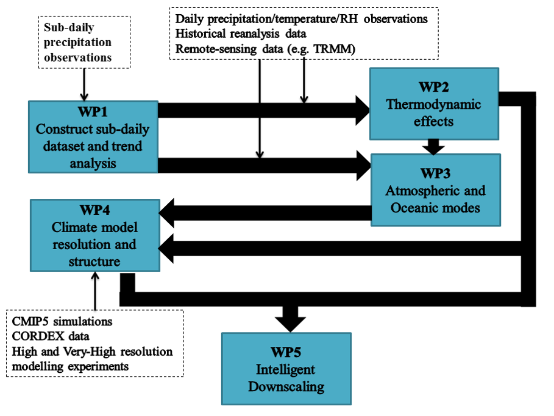Work Packages

The research questions will be addressed through 5 work-packages(WPs):
WP1: Sub-daily precipitation data collection and trend analysis: collect sub-daily precipitation data over four continents, quality check, analyse the global climatology of sub-daily precipitation and extremes (including the diurnal cycle), process to extract indices and quantify recent regional and global trends.
WP2: Influence of local thermodynamics: global analysis of precipitation (extremes) and temperature and humidity scaling for sub-daily data from WP1 and existing global daily datasets: exploring the influence of local environment, storm dynamics and cloud-process feedbacks using observed datasets.
WP3: Influence of large-scale atmosphere-ocean modes: regional analyses of precipitation (extremes) and temperature or humidity datasets linking changes/cycles to clearly defined atmosphere-ocean modes of natural variability, i.e. NAO, ENSO using non-stationary statistical methods.
WP4: Influence of climate model resolution and structure: global analysis, using case-studies of nested RCMs and high-resolution GCMs, to explore model inadequacies in simulation of local thermodynamics and the influence of large-scale atmosphere-ocean modes on extreme precipitation for different climate regimes.
WP5: Intelligent, process-based, downscaling: developing new downscaling methods accounting for non- stationarity in precipitation extremes from natural climate oscillations and global warming, using observed process-understanding from WP2-3 and better understanding of model inadequacies from WP4; explore how this alters the projected response of precipitation and precipitation extremes to global warming.